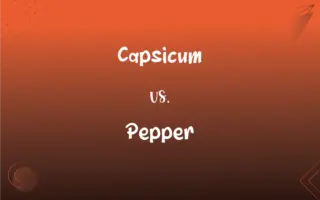Dialog vs. Dialogue: What's the Difference?
By Janet White & Harlon Moss || Updated on May 22, 2024
"Dialog" is commonly used in American English to refer to conversations or exchanges, especially in computing contexts, while "dialogue" is the traditional spelling used worldwide, referring to conversations in literature, plays, and formal discussions.

Key Differences
"Dialog" is a variant of the traditional spelling "dialogue" and is more frequently used in American English, particularly in technical or computing contexts. "Dialogue," on the other hand, is the standard spelling in British English and other English-speaking countries. It encompasses all forms of conversation, whether in literature, plays, movies, or formal discussions.
"Dialog" simplifies the spelling, aligning with American English's tendency towards simplification. Whereas "dialogue" retains the original Greek-derived ending, maintaining its use in formal and literary contexts.
Both terms are interchangeable in many contexts within American English, though "dialogue" remains the preferred form in most English dialects outside the United States. However, when it comes to specific contexts like software interfaces, "dialog" is more widely recognized and accepted.
Comparison Chart
Usage
Common in American English, especially in computing
Traditional spelling, used worldwide
Context
Often seen in technical/computing contexts
Used in literature, plays, formal discussions
ADVERTISEMENT
Regional Preference
Predominantly American English
British English and other English-speaking regions
Spelling Variation
Simplified spelling
Retains original Greek-derived ending
Examples
"Open the dialog box"
"The novel’s dialogue was captivating"
Dialog and Dialogue Definitions
Dialog
Used in software and technical contexts.
Configure the settings through the dialog window.
Dialogue
Used in academic and narrative contexts.
Studying the dialogue in Shakespeare's works.
ADVERTISEMENT
Dialog
Can denote an exchange of ideas or opinions.
The forum facilitates dialog among members.
Dialogue
Preferred spelling in British English and formal contexts.
The dialogue between the leaders was crucial for peace talks.
Dialog
Simplified American English spelling of "dialogue."
We had a brief dialog about the project.
Dialogue
Encompasses all forms of verbal exchange.
Dialogue is essential for effective communication.
Dialog
Variant of dialogue.
Dialogue
A conversation between two or more people.
Dialog
Less common outside the United States.
Dialog is rarely used in British English.
Dialogue
A discussion of positions or beliefs, especially between groups to resolve a disagreement.
Dialog
A conversation or other form of discourse between two or more individuals.
Dialogue
Conversation between characters in a drama or narrative.
Dialog
In a dramatic or literary presentation, the verbal parts of the script or text; the verbalizations of the actors or characters.
Dialogue
The lines or passages in a script that are intended to be spoken.
Dialog
A literary form, where the presentation resembles a conversation.
Dialogue
A literary work written in the form of a conversation
The dialogues of Plato.
Dialog
(computing) A dialog box.
Dialogue
(Music) A composition or passage for two or more parts, suggestive of conversational interplay.
Dialog
To discuss or negotiate so that all parties can reach an understanding.
Dialogue
To express as or in a dialogue
Dialogued parts of the story.
Dialog
A conversation between two persons
Dialogue
To engage in a dialogue.
Dialog
The lines spoken by characters in drama or fiction
Dialogue
A conversation or other form of discourse between two or more individuals.
Bill and Melinda maintained a dialogue via email over the course of their long-distance relationship.
Start up a dialogue
Dialog
A literary composition in the form of a conversation between two people;
He has read Plato's Dialogues in the original Greek
Dialogue
(authorship) In a dramatic or literary presentation, the verbal parts of the script or text; the verbalizations of the actors or characters.
The movie had great special effects, but the dialogue was lackluster.
Dialog
A conversation between two or more people, often used in computing.
The program opened a dialog box for user input.
Dialogue
(philosophy) A literary form, where the presentation resembles a conversation.
A literary historian, she specialized in the dialogues of ancient Greek philosophers.
Dialogue
(computing) A dialogue box.
Once the My Computer dialogue opens, select Local Disk (C:), then right click and scroll down.
Dialogue
To discuss or negotiate so that all parties can reach an understanding.
Pearson wanted to dialogue with his overseas counterparts about the new reporting requirements.
Dialogue
(transitive) To put into dialogue form.
Dialogue
(obsolete) To take part in a dialogue; to dialogize.
Dialogue
A conversation between two or more persons; particularly, a formal conservation in theatrical performances or in scholastic exercises.
Dialogue
A written composition in which two or more persons are represented as conversing or reasoning on some topic; as, the Dialogues of Plato.
Dialogue
To take part in a dialogue; to dialogize.
Dialogue
To express as in dialogue.
And dialogued for him what he would say.
Dialogue
A conversation between two persons
Dialogue
The lines spoken by characters in drama or fiction
Dialogue
A literary composition in the form of a conversation between two people;
He has read Plato's Dialogues in the original Greek
Dialogue
A discussion intended to produce an agreement;
The buyout negotiation lasted several days
They disagreed but kept an open dialogue
Talks between Israelis and Palestinians
Dialogue
A conversation between two or more people, used in all English dialects.
The play's dialogue was sharp and witty.
Dialogue
Traditional spelling for literary and formal discussions.
The characters' dialogue revealed their inner thoughts.
FAQs
Is "dialogue" used in computing?
In computing, "dialog" is more common, but "dialogue" can also be used interchangeably.
Is "dialog" used outside the United States?
Dialog is less common outside the United States, where "dialogue" is preferred.
What does "dialog" mean?
Dialog is a simplified American English spelling of "dialogue," often used in technical contexts like computing.
What does "dialogue" mean?
Dialogue refers to a conversation between two or more people, commonly used in literature, plays, and formal discussions.
Why is "dialog" simpler?
Dialog is a simplified spelling that aligns with American English's preference for shorter versions.
Is "dialog" formal or informal?
Dialog is often considered less formal and more suited to technical or informal contexts.
Which spelling is correct in academic writing?
Dialogue is the correct and preferred spelling in academic writing.
Is there a difference in pronunciation between "dialog" and "dialogue"?
No, both are pronounced the same way.
Why do Americans use "dialog"?
Americans often prefer simplified spellings, leading to the adoption of "dialog."
Is "dialog" appropriate for formal documents?
Dialogue is more appropriate for formal documents.
Can "dialog" be used in literature?
While it can be, "dialogue" is the preferred spelling in literary contexts.
Can "dialogue" refer to a conversation in a play?
Yes, dialogue is the standard term for conversations in plays.
Which is more widely accepted globally?
Dialogue is more widely accepted globally.
Can "dialogue" imply a written exchange?
Yes, dialogue can imply both spoken and written exchanges.
Do both terms share the same origin?
Yes, both terms originate from the Greek word "dialogos."
Is "dialog" recognized in formal international English exams?
Dialogue is the recognized and preferred spelling in formal international English exams.
Does "dialog" appear in British English?
Dialog is rarely used in British English, where "dialogue" is standard.
Can "dialog" refer to non-verbal exchanges?
No, both "dialog" and "dialogue" refer to verbal exchanges.
Can "dialogue" be used in software terminology?
Yes, but "dialog" is more common in this context.
Which term is better for everyday conversation?
Dialogue is generally better for everyday conversation.
About Author
Written by
Janet WhiteJanet White has been an esteemed writer and blogger for Difference Wiki. Holding a Master's degree in Science and Medical Journalism from the prestigious Boston University, she has consistently demonstrated her expertise and passion for her field. When she's not immersed in her work, Janet relishes her time exercising, delving into a good book, and cherishing moments with friends and family.
Co-written by
Harlon MossHarlon is a seasoned quality moderator and accomplished content writer for Difference Wiki. An alumnus of the prestigious University of California, he earned his degree in Computer Science. Leveraging his academic background, Harlon brings a meticulous and informed perspective to his work, ensuring content accuracy and excellence.































































